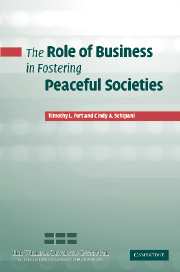Book contents
- Frontmatter
- Contents
- List of tables
- Acknowledgements
- Introduction
- Part I The plausibility of connecting business and peace
- Part II Current standards and their amenability to peace
- 3 Corporate governance and sustainable peace
- 4 Ethical business behavior and sustainable peace
- Part III Two illustrative issues: gender equality and ecology
- Conclusion
- Index
4 - Ethical business behavior and sustainable peace
Published online by Cambridge University Press: 22 September 2009
- Frontmatter
- Contents
- List of tables
- Acknowledgements
- Introduction
- Part I The plausibility of connecting business and peace
- Part II Current standards and their amenability to peace
- 3 Corporate governance and sustainable peace
- 4 Ethical business behavior and sustainable peace
- Part III Two illustrative issues: gender equality and ecology
- Conclusion
- Index
Summary
The gist of the argument that there is a plausible, conceptual relationship among the roles of business, business ethics, and sustainable peace is that multinational corporations can contribute to reduction of violence. Given the challenges confronting the process of globalization, particularly as they apply to business, corporations have the potential to play an important role in contributing to the conditions of sustainable peace. As previously mentioned in chapter 1, business can do this by:
fostering economic development, particularly for the marginalized;
exercising track two diplomacy;
adopting external evaluation principles, such as transparency and supporting a legal system that enforces those principles, i.e. a “rule of law;” and
nourishing a sense of community both within the company and in the areas in which the company is located.
The purpose of this chapter is to sketch this model conceptually and illustrate the themes by the actions of specific companies.
Corporate governance regimes, attentive to the comparative concerns already raised, can integrate these characteristics in culturally appropriate ways. Because the issues involved in this book and particularly in this chapter revolve around assessments of the moral responsibilities of business, Section I assesses the concept of businesses contributing to sustainable peace from the perspective of leading theories from the field of business ethics. Section II discusses the four contributions companies can and already do make toward sustainable peace.
- Type
- Chapter
- Information
- The Role of Business in Fostering Peaceful Societies , pp. 109 - 140Publisher: Cambridge University PressPrint publication year: 2004

